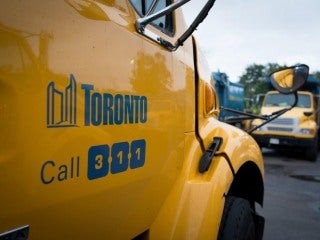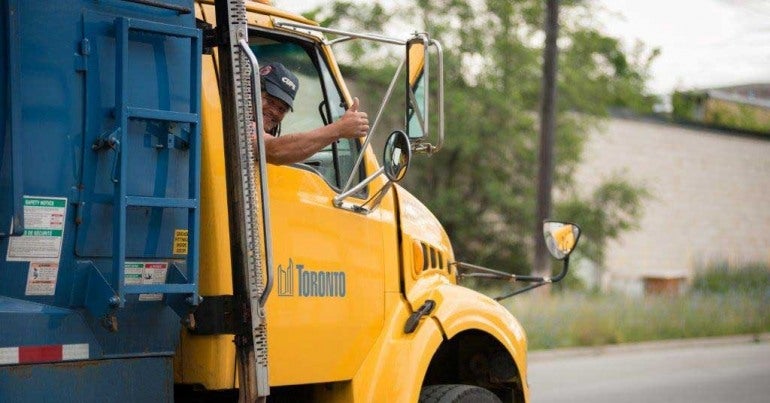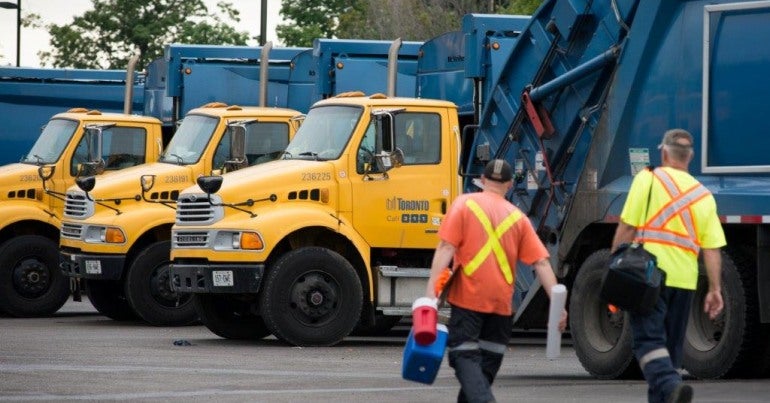
Public municipal solid waste services are fundamental to the quality of life in our communities. How we collect and dispose of our garbage and recycling is essential to our health, our environmental future and the appearance of our cities and towns.
Landfills are reaching the end of their lifespan, and carry a high financial and environmental price. Extended producer responsibility legislation and a decline in the market price of recyclables add to the pressure on municipalities struggling to deliver high-quality, affordable public services.
In order to meet these challenges, it is vital that municipalities retain accountability, flexibility and control when it comes to their solid waste services. Publicly-delivered services are efficient, committed to service and environmental sustainability, and accountable to the public.
Some municipalities have turned to privatized collection in an attempt to cut costs. Reputable studies conclude that solid waste services delivered by municipal employees are comparable in cost and efficiency to privately contracted services. There is no consistent evidence showing that contracted-out private sector waste collection is less costly and more efficient than waste collection provided by public employees.
This is confirmed by recent experience across Canada, showing that contracting out leads to fewer well-paying jobs, lower levels of service, and can be a barrier to effective waste diversion.
Ottawa
In 1998, Ottawa contracted out solid waste collection in four zones, and retained in-house collection in a fifth zone. The city is gradually contracting its garbage, green bin, and recycling services back in, having faced rising contractor costs and declining public satisfaction. Two zones are now serviced by city workers. From a cost perspective, the public side is impressive. A 2009 internal audit found in-house collection in this one downtown zone had saved the city over $5.28 million since 1999.1 In 2012, the contract was renewed for this zone and city workers began collecting solid waste in a second zone in Ottawa’s east end.2 In 2013, the two city-run zones saved a further $677,530.3 In addition, complaints resulting from the city-run zones were significantly lower than the contracted zones, averaging one call per 1,000 households for the in-house zones, compared to 1.53 calls per 1,000 houses for the three contracted out zones.4 Service in one of the contracted zones was so poor that the city levied fines against the contractor, Waste Management.5
The City of Ottawa has also had significant difficulties with contractors that they have been working with for waste diversion. In 2015, Plasco, a new technology start-up that the city had been working with on a waste-to-energy plan, went bankrupt.6 Ottawa has also had significant difficulties with its organic waste contractor, Orgaworld, including a lengthy legal battle over the type of waste that the company would accept at its processing facility.7 In the contract’s first three years, the city paid nearly $7.7 million in what the city auditor called “unnecessary” costs stemming from the dispute over how much kitchen waste and yard waste Orgaworld would accept.8
The cost of delivering curbside garbage and recycling in Ottawa is one of the lowest in Canada at $0.83 per pick-up, while providing a high level of service.9 A 2009 city report on the savings from in-house collection attributed the savings in part to “the productivity of dedicated and experienced staff.”10 Price competitiveness has been driven by public sector leadership. Having a public sector comparator in place has prevented price fixing from the private sector and continues to show year after year the competitiveness of the public model.
Calgary
The City of Calgary recently reaffirmed a completely public model for its garbage and recycling collection. A 2015 city-commissioned report detailing the current state of Calgary’s residential solid waste services recommends against contracting out solid waste collection services on the basis that there is no evidence contracting out will deliver significant cost savings.11 The consultant’s report outlined the issues with private, for-profit collection:
- On labour costs: “[I]n many cases, the majority of the cost savings afforded by the private sector results from paying less to collection workers (in salary plus benefits), and because private providers have more flexible work rules.”12
- On costs: “While profit can drive efficiency, it also adds an additional 5-20 per cent to the cost of private sector service delivery that is not included with public sector service delivery.”13
-
On service: “The profit motive and the drive for efficiency may sometimes be in direct conflict with service quality: Providing extra services to the public, or simply fulfilling all requirements of a contract, typically result in lower profits to a private sector provider.”14
The same report provides comparisons to other regions showing that Calgary’s per-pick up cost of $1.27 in Calgary is well within the range of comparator cities (a mix of municipalities with fully public, fully private and combined public-private delivery), and is less than areas that have a fully privatized model.
Vancouver
The City of Vancouver has a fully public delivery model. With a completely public system the city has had the flexibility and control required to make changes to the services. In 2011, City Council voted to make Vancouver the greenest city in the world by 2020. As part of this plan, city council’s zero waste strategy aims to halve the amount of waste going to landfill or incinerator, using 2008 as a benchmark year. By 2012, the amount of waste going to landfill had dropped by 12 per cent.15
In 2005-2006, Vancouver converted its solid waste collection to a fully automated cart system, with major human and financial benefits. The shift led to a dramatic drop in time lost to injury and sick leave. In 2003, the city recorded 31 time loss injuries and 1067 shifts missed due to illness. By 2005, part-way through the transition, the numbers had declined to 11 time loss injuries and 970 shifts missed due to illness. In 2005- 2006, workers who had been transitioned to the new automated cart system recorded zero time loss injuries.16
Winnipeg
In 2011, the City of Winnipeg contracted out its garbage and recycling collection services. By 2012 resident complaints had risen by 1,414 per cent, as Emterra was consistently delinquent on pick-ups. The city had to issue an ultimatum to the company to complete its pick-ups in a timely manner or be fined.17 In 2013, the city had to take further action, and fined Emterra more than $400,000 for missed pick-ups.18
In 2013, Emterra collection workers joined CUPE 500, the union representing Winnipeg’s municipal workers. The workers have since negotiated a collective agreement that improves their wages and provides the workers with increased representation for health and safety and other issues.19
Hamilton
In Hamilton, garbage collection has been divided evenly between public and private providers since 2002. According to the 2009 Ontario Municipal Benchmarking Initiative, public collection cost $95.29 and private collection cost $96.45 per property. The City of Hamilton chose the split public-private model to ensure a competitive market while retaining the ability to provide the service, and renewed this model in 2011.20 The positive role of the public sector in residential collection was reaffirmed in a 2012 report. City staff noted the split system provides “long term best value for Hamilton taxpayers.” Staff further commented that savings from the split public/private model could add up to $60 million between 2013 and 2020, while noting the model would also provide “increased service levels” and “the opportunity to increase diversion from landfill.”21
Other municipalities
Privatization of garbage has had significant negative consequences for many communities. In Quebec City, the push to privatize garbage collection services resulted in the city violating its collective agreement with CUPE members. As a result, a fine of $1.5 million was levied against the city by an arbitrator. After privatizing services in Windsor not only were the proposed cost savings never realized but the diversion rate of recyclables dropped to an abysmal 38 per cent.22 At the same time in Windsor, resident complaints spiked and have remained high.23
The experiences of Coquitlam and Port Moody in British Columbia provide insights into the problems with privatization. In 2009, Port Moody brought garbage collection back in house after significant problems with contractors.24 The city invested in automated pick up and engaged in a widespread public education about the new collection system and the city’s waste reduction goals. As a result, the city’s solid waste services have achieved record high resident satisfaction, increased diversion rates from 47 per cent to 73 per cent, 25 and won recognition from the Solid Waste Association of North America, recognizing the city’s communications campaign to engage the public on its new collection system and ambitious diversion goals.26 Since moving to in-house delivery, the city’s solid waste costs have been stable and predictable.
In contrast, the neighbouring city of Coquitlam struggled with contractors over the same time period. Since 2009, the city has hired and fired three different contractors. Residents have seen rates rise from $160 to $349 a year with no increase in services.27 At one point, private garbage operators who didn’t collect garbage in a timely manner created problems with bears in the city.28
Not worth the risk
The experience of other Canadian municipalities reveals serious questions about the claims that solid waste privatization will cost less and delivery the same or better-quality service. On major criteria such as costs and service standards, the private sector does not automatically deliver. Calgary’s recent decision is instructive for Toronto – the city heeded clear advice that there are significant risks when contracting out.
Contracting out garbage services also means municipalities lose control and flexibility for implementing new waste diversion programs like recycling and composting.
Keeping east end collection public will ensure that Toronto retains control and accountability over this critical service. Let’s keep our solid waste services public for a clean, green city and quality services we can depend on.
- 1. http://ottawa.ca/en/news/operating-savings-first-year-new-house-solid-waste-collection-contract
- 2. http://ottawa.ca/en/news/operating-savings-first-year-new-house-solid-waste-collection-contract
- 3. Environment Committee Report Number 31, City of Ottawa, September 10, 2014
- 4. http://app05.ottawa.ca/sirepub/cache/2/5g4bwetlp3qycqgqksapd5pt/26164009272016103837777.PDF
- 5. http://www.ottawasun.com/2013/06/26/city-fines-waste-management-for-sloppy-trash-pickup
- 6. http://www.ottawasun.com/2015/02/17/environment-committee-votes-to-dump-foundering-plasco
- 7. http://ottawacitizen.com/news/local-news/0701-orgaworld
- 8. http://documents.ottawa.ca/sites/documents.ottawa.ca/files/documents/mediaReleaseSSO_en.pdf
- 9. City of Calgary Residential Collection Report, CH2M Hill, August 2014
- 10. http://ottawa.ca/calendar/ottawa/citycouncil/pec/2010/02-09/15%20-%20ACS2010-ICS-ESD-0005%20-%20Audit%20report%20In-house%20Solid%20Waste%20Collection.htm
- 11. City of Calgary Residential Collection Report, CH2M Hill, August 2014
- 12. Ibid. Sec.3-3 Findings
- 13. Ibid. Sec.3-3 Findings
- 14. Ibid. Sec.3-3 Findings
- 15. http://vancouver.ca/green-vancouver/targets-and-priority-actions.aspx
- 16. City of Vancouver Automated Collection of Solid Waste, July 2006, downloaded from civicinfo.bc.ca
- 17. http://www.cbc.ca/news/canada/manitoba/emterra-ordered-to-catch-up-on-trash-pickup-by-sunday-1.1149330
- 18. http://www.winnipegsun.com/2013/01/07/emterra-has-been-fined-400k-for-missing-winnipeg-garbage-recycling-pickup
- 19. http://www.cbc.ca/news/canada/manitoba/private-emterra-workers-join-city-of-winnipeg-union-1.1318531
- 20. http://www.solidwastemag.com/features/contracting-out/
- 21. City of Hamilton Public Works Department report. Presented January 16, 2012. Report no. PW11030d
- 22. 2013 municipal performance measures downloaded from http://www.citywindsor.ca/cityhall/-Financial-Documents/Pages/Annual-Reports.aspx
- 23. http://blogs.windsorstar.com/news/dirty-yards-are-still-the-top-complaint-to-windsors-311-call-centre and http://blogs.windsorstar.com/news/worker-injures-arm-during-garbage-pick-up
- 24. http://www.portmoody.ca/index.aspx?page=905
- 25. http://www.civicinfo.bc.ca/practices_innovations/portmoody_bpgen_solidwasteprogram.doc
- 26. http://www.portmoody.ca/index.aspx?page=43&recordid=32&returnURL=%2findex.aspx
- 27. Coquitlam annual report 2013 downloaded from http://www.coquitlam.ca/city-hall/plans/annual-report.aspx
- 28. http://www.tricitynews.com/news/229748801.html



